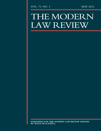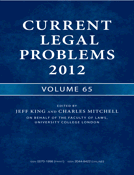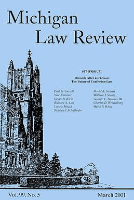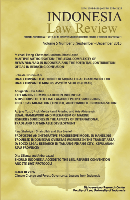
MODERN LAW REVIEW
Scope & Guideline
Exploring the Frontiers of Legal Thought.
Introduction
Aims and Scopes
- Interdisciplinary Legal Scholarship:
The journal promotes research that transcends traditional legal boundaries, integrating insights from sociology, politics, economics, and technology to address complex legal challenges. - Critical Examination of Legal Theories:
A consistent focus on critiquing existing legal frameworks and theories, encouraging authors to question established norms and propose alternative perspectives. - Emerging Legal Technologies and Their Implications:
Research on the impact of technology on law, including artificial intelligence, digital rights, and the transformation of legal practice. - Social Justice and Human Rights:
A significant emphasis on themes related to social justice, human rights, and the law's role in addressing inequality and systemic injustice. - Comparative and International Law Perspectives:
Encouragement of comparative analyses and international perspectives, particularly regarding human rights, environmental law, and global governance.
Trending and Emerging
- Artificial Intelligence and Law:
An emerging trend focusing on the implications of AI in legal contexts, including questions of accountability, ethics, and the future of legal practice. - Environmental Law and Climate Justice:
Increasing attention to environmental law, particularly regarding climate change, sustainability, and the rights of nature, showcasing a commitment to addressing global crises. - Social Movements and Legal Change:
A growing body of work examining the intersection of law and social movements, exploring how legal frameworks can both hinder and facilitate social change. - Digital Rights and Privacy:
A significant rise in papers discussing digital rights, data protection, and privacy law, reflecting societal concerns over surveillance and data misuse. - Postcolonial and Decolonial Legal Studies:
Emerging discussions on the implications of colonial histories on current legal systems, focusing on decolonization and the rethinking of legal principles in a global context.
Declining or Waning
- Traditional Legal Doctrines:
There appears to be a declining interest in traditional legal doctrines and principles, as newer, more dynamic approaches to law gain traction. - Historical Legal Analysis:
While historical perspectives remain important, there is a noticeable decrease in papers focused solely on historical legal analysis, as contemporary issues take precedence. - Conventional Legal Education Methods:
Research that critiques traditional legal education methods is appearing less frequently, suggesting a shift towards more innovative and practical approaches to law teaching. - Gender-Specific Legal Issues:
Although still relevant, specific discussions solely focused on gender within legal frameworks seem to be waning, possibly due to the broader integration of gender issues in various legal contexts. - Legal Formalism:
A reduction in the exploration of legal formalism as a standalone topic, with scholars increasingly favoring contextual and pragmatic approaches to legal analysis.
Similar Journals

Denver Law Review
Empowering scholarship through open access insights.Welcome to the Denver Law Review, a distinguished journal published by the University of Denver, Sturm College of Law that serves as a pivotal platform for the exploration and discussion of contemporary legal issues. With its ISSN of 2469-6463, the journal has established itself within the legal scholarship community, holding a notable Q2 rank within the field of Law according to the 2023 category quartiles. The Denver Law Review is committed to advancing legal research and scholarship, providing open access to critical insights and analyses essential for practitioners, scholars, and students alike. With an impact factor bolstered by its Scopus ranking at 620/1025, the journal facilitates rich scholarly conversations and promotes the understanding of the law in today's dynamic context. We invite you to explore the innovative articles and research that contribute to the evolving landscape of jurisprudence.

Current Legal Problems
Pioneering discussions on pressing legal matters.Current Legal Problems is a premier academic journal published by Oxford University Press, dedicated to advancing the field of law through critical analysis and interdisciplinary research. With an ISSN of 0070-1998 and an E-ISSN of 2044-8422, this journal has established itself as a vital resource for legal scholars and practitioners alike since its inception in 1983. Recognized with a Q1 category ranking in Law for 2023, it ranks notably in Scopus as #415 out of 1025, placing it in the 59th percentile, further underlining its influence and importance. The journal's scope encompasses contemporary legal issues, providing a platform for innovative legal thought and discussion. Although it does not follow an open access model, the journal remains accessible through both print and digital subscriptions, catering to a global audience from its base in Oxford, United Kingdom. Researchers, students, and legal professionals will find Current Legal Problems indispensable for staying informed about the latest legal developments and scholarly debates.

Journal of International and Comparative Law
Exploring Diverse Perspectives in Legal ScholarshipThe Journal of International and Comparative Law is a premier academic publication dedicated to advancing knowledge and sparking critical discourse in the field of law. Published by SWEET & MAXWELL, this journal aims to bridge the gap between international legal standards and comparative practices, making it an essential resource for legal scholars, practitioners, and students alike. With an impact factor that positions it in the Q3 category of legal journals and a Scopus rank of #534 out of 1025 in the Social Sciences - Law category, it is recognized for its contribution to the legal community since its inception in 2018. The journal, based in Hong Kong, seeks to publish high-quality, peer-reviewed articles that reflect a diverse range of legal perspectives and methodologies. Although the journal is not open access, it remains committed to disseminating vital research and case studies that shape contemporary legal paradigms. Scholars and legal professionals can stay informed on authoritative insights by engaging with this important resource until 2024 and beyond.

Tsinghua China Law Review
Shaping the future of law with rigorous analysis.Tsinghua China Law Review is an esteemed academic journal published by the Tsinghua University School of Law in China, dedicated to advancing the field of law through rigorous scholarly analysis and critical discourse. Established in 2019, this journal has carved a niche for itself within the legal community, striving to cover pertinent issues in Chinese law and its intersections with global legal trends. Although it retains an H-index disclaim and has discontinued its coverage in Scopus after 2024, it continues to provide a platform for innovative research and thought-provoking essays. Recognized for its contributions, it is categorized as Q4 in Law based on the latest ranking, positioning it at a pivotal juncture for emerging scholars aiming to make their mark within the legal scholarship landscape. With open access options limited, Tsinghua China Law Review remains a valuable resource for researchers, professionals, and students eager to engage with contemporary legal issues that shape society in an increasingly interconnected world.

MICHIGAN LAW REVIEW
Exploring the Intersection of Law and SocietyMICHIGAN LAW REVIEW, published by the Michigan Law Review Association, stands as a prestigious journal in the field of law, offering an influential platform for critical legal scholarship and discussion. With an ISSN of 0026-2234 and an E-ISSN of 1939-8557, this journal features a longstanding commitment to analyzing contemporary legal issues and contributing to academic dialogue. Situated in the United States, the journal reflects a rich historical legacy, with converged publication years stretching from 1974 to present, thereby preserving its position as a key resource for legal researchers and practitioners. Ranked in the Q1 category within its field for 2023, and holding a notable Scopus rank of 276 out of 1025 in the Social Sciences _ Law category, it plays a critical role in shaping legal thought and policy. Although not open access, its detailed articles and comprehensive reviews are instrumental for law students, academics, and legal professionals who seek to stay at the forefront of legal scholarship.

Utrecht Journal of International and European Law
Exploring Contemporary Legal ChallengesUtrecht Journal of International and European Law, published by UBIQUITY PRESS LTD, serves as a dynamic platform for the dissemination of scholarly research in the realms of international and European law. Since its inception as an open-access journal in 2013, it has provided unrestricted access to cutting-edge legal scholarship, fostering global dialogue among legal professionals, researchers, and students. With a notable Scopus rank of 249 out of 1,025 in the law category and a commendable Q3 rating, the journal emphasizes innovative legal theories and practices relevant to contemporary global challenges. Located in the heart of the United Kingdom, the Utrecht Journal is committed to maintaining high academic standards while also promoting the exchange of knowledge across borders, which is crucial given the ever-evolving landscape of international law. As it converges its focus from 2020 to 2024, the journal seeks to become an essential reference for those dedicated to the exploration and expansion of legal discourse in this vital field.

OSGOODE HALL LAW JOURNAL
Pioneering Insights in Canadian JurisprudenceOsgoode Hall Law Journal, published by the renowned York University Osgoode Hall Law School, serves as a vital platform for legal scholarship in Canada. With a commitment to advancing knowledge in various fields of law, this journal publishes a broad range of articles, case studies, and critical analyses that address contemporary legal issues. While specific impact factors and indexing metrics such as H-Index and Scopus Ranks are not available, the journal's long-standing reputation and contributions to legal education make it an essential resource for researchers, legal practitioners, and students alike. Although it does not offer Open Access options, readers can access its content through libraries and subscriptions, ensuring the dissemination of high-quality legal research. The journal's aim is to foster robust dialogue among legal scholars and practitioners, thereby shaping the future of legal discourse in Canada and beyond.

UNIVERSITY OF ILLINOIS LAW REVIEW
Connecting Scholars and Practitioners in the Legal RealmUNIVERSITY OF ILLINOIS LAW REVIEW, published by the esteemed University of Illinois, stands as a pivotal forum for legal scholarship since its inception. With an ISSN of 0276-9948 and an E-ISSN of 1942-9231, this journal serves the legal community by offering rigorous analyses and innovative insights into contemporary legal issues, making it an essential resource for researchers, legal practitioners, and students alike. Although not an open-access journal, it operates within the United States, with contributions stemming from a rich academic tradition. Notably, it holds a respectable Q3 category ranking in Law according to the 2023 category quartiles and ranks 360th out of 1025 in the Scopus Social Sciences Law rankings, placing it in the 64th percentile, affirming its significance in the legal discourse. The journal's scope encompasses a broad range of legal topics, from constitutional law to international legal studies, thus catering to a diverse readership keen on advancing their understanding of the law. In an era marked by evolving legal landscapes, the UNIVERSITY OF ILLINOIS LAW REVIEW remains committed to fostering intellectual engagement and promoting scholarly exchange among all members of the legal field.

Indonesia Law Review
Fostering Scholarly Discourse on Legal ChallengesIndonesia Law Review is a premier open-access academic journal dedicated to advancing knowledge in the fields of law and social sciences, with particular emphasis on the Indonesian legal landscape. Established by the Indonesian Law Review, this journal has made significant strides since becoming open access in 2014, ensuring that research is freely available to a global audience. Based in Depok, West Java, the journal seeks to foster scholarly discourse on legal issues pertinent to Indonesia, while also contributing to the broader field of education and social sciences. With its current Scopus rankings placing it within the top tiers of law and social sciences, including a Q3 categorization in law and a Q4 classification in education and miscellaneous social sciences, the **Indonesia Law Review** serves as a vital platform for researchers, professionals, and students to disseminate their findings and engage with contemporary legal dilemmas. The journal is committed to providing a robust forum for innovative legal scholarship and is an essential resource for anyone seeking to understand the complexities of law in Indonesia and beyond.

AJIL Unbound
Cultivating Critical Conversations in Law and SocietyAJIL Unbound is an esteemed open-access journal published by Cambidge University Press that has been serving the legal academic community since 2013. With its focus on international law and related social science disciplines, this journal offers a platform for innovative research and critical discourse in the field. Thanks to its robust engagement features and commitment to accessibility, AJIL Unbound facilitates the dissemination of knowledge while fostering scholarly communication among researchers, practitioners, and students. With a notable ranking of #192 out of 1025 in the realm of Social Sciences Law, it stands in the 81st percentile, showcasing its influence and reach within the legal field. Its open-access model enhances visibility and encourages wider participation in discussions surrounding pressing legal issues. As the journal continues to converge its objectives from 2013 to 2024, it remains a vital resource for academics looking to explore contemporary legal challenges and advancements.